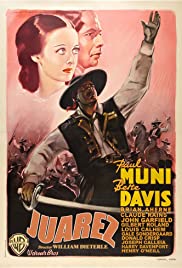
JUAREZ
US, 1938, 125 minutes, Black and white.
Paul Muni, Bette Davis, Brian Aherne, Claude Rains, John Garfield, Donald Crisp, Gale Sondergaard, Joseph Calleia, Gilbert Roland, Louis Calhern.
Directed by William Diertele.
Juarez is one of William Diertele's biographies at Warner Bros. in the thirties, of Emile Zola, Louis Pasteur. This film is not as striking as the former films, though it is very good entertainment.
Paul Muni featured in many of these biographies, especially those of Zola and Pasteur, for the latter winning an Oscar. Here he relies on makeup and a very restrained performance as the Mexican leader. Bette Davis in an unusually restrained and romantic role is the Empress, Carlotta. Her performance is striking when we remember that this was the year in which she made both Dark Victory and The Private Lives of Elizabeth and Essex. Brian Aherne is Maximilian and carries off a strange role of a very edifyingly naive man very well indeed. Claude Rains, Gale Sondergaard, John Garfield are all effective in minor roles. Thus the film is satisfying biography and interesting popular history.
1. Enjoyable film? Interesting? Its place in the Warner Brothers biographies of the late 30's? With Paul Muni? Warner Brothers lavish historical style, black end white photography, Korngold music?
2. The impact on older audiences in the 30's and now? The parallels in the political situation of the time, now?
3. Paul Muni and his style of characterisation? His appearance so Juarez, ugliness, shortness, his look, clothes? The importance of the sequences illustrating his wisdom? His dealing with his departed ambitions? With Maximilian's theory of democracy? In discussing strategy? Discussions with Diaz? His ideas of justice, the ruling of Mexico, the constitution, democracy? The accountability of a king and the accountability of a president? The king changing the people, the people changing the president? His of heritage? His appeal in his time? His achievement for Mexico? How admirable a character according to the film?
4. The film introduced Louis napoleon first. The explanation of his tyranny, background? As a type? Claude Raines' style in portraying him? At court, his attitude towards Mexico and empire, his playing with the conservative Texicans and their ambitions? His strategy with Maximilian, the advice of his wife? The legality of his empire? His greed and exploitation of Mexico and war? The manipulation of the plebiscite? His use of the military, Maximilian as a stooge? The sequence with his posing for his portrait and the visit of the American politician? His callousness in withdrawing his forces? the abandoning Maximilian? A symbol of despotic evil? The portrayal of the military in Mexico, harsh measures and cruelty yet in final grudging admiration for Maximilian? The conservative land owners and their wanting Maximilian to give their land back and his decision against them?
6. The picture of Mexico an a historical and political film, The history of Mexico and its conquering, the Indians and their subjugation, the Spaniards? Military rule, monarchy? The constitution for a republic and its importance in the nineteenth century? The ownership of the land? The portrayal of the battles and the defeat of the republicans? Maximilian and Carlotta arriving within this context and their ignorance? Maximilian's Hapsburg style, elegance and upbringing, his vision and hopes? his presuppositions about royalty? His hopes for ruling well, his ruffling the aristocracy, his forbidding the army to be cruel? The impact of the letters by Juarez? The puzzle about how to act? His attempts at honesty, the visit to Diaz in the prison, the offer for Juarez to be prime minister? The choice of the heir? His giving his signature for the massacre? The inevitability of war? The questions of Joe, his abdication so many times and his decision to remain? how honest a character, out of place in republican Mexico? The significance of the discussions about democracy and Maximilian's theory about monarchy and its incorruptibility? His seeing only a word of difference between himself and Juarez? The inevitability of the clash of principles? Carlotta and her support of Maximilian, her advice, her wanting to hate the child, the sequence of her accepting the heir and her own inability to have a child? Her determination to go to France for her husband? The treatment given her by Napoleon? Her fears, mildness and breakdown? Metternich and his coping with the situation? The romantic overtones of La Paloma?
10. The news of Carlotta's madness for Maximilian and his decision to go through with quelling the republic? the build-up to his capture, imprisonment, second trial, the preparation for his death? The visualising of his death and the impact on screen?
11 The important sequence where Juarez confronts his deputy who had broken away from him, the popular support and his walking towards the men with the rifles, their not shooting?
12. The final confrontation between Maximilian and Juarez? Porferio Diaz trying to help? The coffin and Juarez’s apology?
13. The glimpse of history, an adventure film, a political film, a biography and character study?